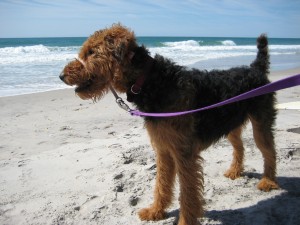Hot Summer Tips
 Summer is a time for fun, both inside and out, but be sure to create a safe environment for your pet so you won’t have to make any unexpected visits to your vet.
Summer is a time for fun, both inside and out, but be sure to create a safe environment for your pet so you won’t have to make any unexpected visits to your vet.
ALLERGIES
Watch for skin allergies on your pet. Any type of skin irritation can turn into a serious problem in a very short time. Also, inhalant allergies can be very bad at this time of the year. Watch your pet for any face rubbing or chewing at the feet.
AUTOMOBILES
Never leave an animal in a car! It only takes a few minutes for a car to heat up to 180°F! Also be careful about spilled or accessible antifreeze from your car. It is fatal to your pets.
BITES AND STINGS
The swelling from a bite or sting of an insect will usually go down in about an hour. If not, try using a cold compact on the sting site. If you think your pet may be going into shock, which does happen, take your pet to a veterinarian immediately!
EAR MITES
These little critters love nice, warm ears—especially cat ears. Dogs are not as prone to ear mites, but they are more prone to ear infections. Dogs that swim have an even greater chance of this due to water getting trapped in their ears. Check your pet’s ears regularly.
EXPOSURE
Prolonged exposure to the sun can cause sunburn to those animals with fair skin, such as white-coated animals and those with pink noses and paws. To prevent this, use some human sunblock SPF 15 to 30 when outside.
FANS
Fans can be very dangerous for curious paws and tails. So be sure to keep them out of reach of your pets.
FRESH WATER
Keep plenty of cool, fresh water available for your pet at all times. It helps them stay cool and keeps them from becoming dehydrated.
GARBAGE
Keep the garbage out of the reach of your pet. In the heat of the summer, garbage can turn into poisonous material, such as botulism or uremia. (Ask Dr. Schwab about her summer puppy story.)
GRASS
If you have your grass treated, make sure it is safe for your pet! Ask the chemical company for a copy of the ingredients and have them looked over by your veterinarian. Cats and dogs like to eat grass and other plants, some of which might be toxic to your pet. Be careful which plants your pet nibbles on inside and outside. For a list of plants to be careful about, please see our plant toxicity page.
HAIRCOAT
Try to keep your pet’s haircoat brushed and clean to prevent mats. Mats can cause all kinds of problems, including hotspots. Parasites can also hide in mats and be undetectable for quite some time. Flies will also lay eggs in these warm places, and then maggots will set in. Keeping your pets’ haircoat clean helps keep them safe and cool!
HEATSTROKE
Any pet is a potential victim of heatstroke, but those that have an increased risk include short-nosed animals (e.g., pugs), overweight pets, and asthmatic pets. Heatstroke is caused by an animal breathing air that is hotter than its body temperature. Save outdoor activities such as jogging for early morning or late evening to avoid heatstroke.
MOSQUITOES
These pests carry heartworms. Please put your pet on heartworm prevention to stop the infestation. Any place with standing water can be an even higher risk area for mosquitoes carrying heartworms. Please visit our heartworm page to learn more about this deadly parasite.
PAW PADS
Remember when walking your pets that they are walking in their bare feet. Therefore, they are more likely to get burned if it is too hot. Be careful!
POOLS
Pools can be a very serious threat to your pet. Most pets can swim for a short period of time, but not for long. Taking precautions, such as putting carpet around the pool so they can pull themselves out, may save your pet’s life.
SHADE
If your pet is outdoors for any length of time, make sure it has plenty of shade! Too much sun could lead to heatstroke and eventually death.
SKIN
External parasites continue to be a problem through the whole summer, so always be on the lookout for fleas, ticks, maggots, and mosquitoes. Also be careful with your choice of shampoos and flea-control products. Some of these can actually cause skin conditions instead of relieving them.
VACATION
It is usually best to try to leave your pet with friends or in a kennel while you are away. If this is not possible and your pet must travel with you, make sure your pet is welcome wherever you are going. Always carry plenty of food, fresh water, I.D. tags, and vaccine records. Make sure they are in a carrier while in your car in case of an accident and that the carrier is well ventilated.

